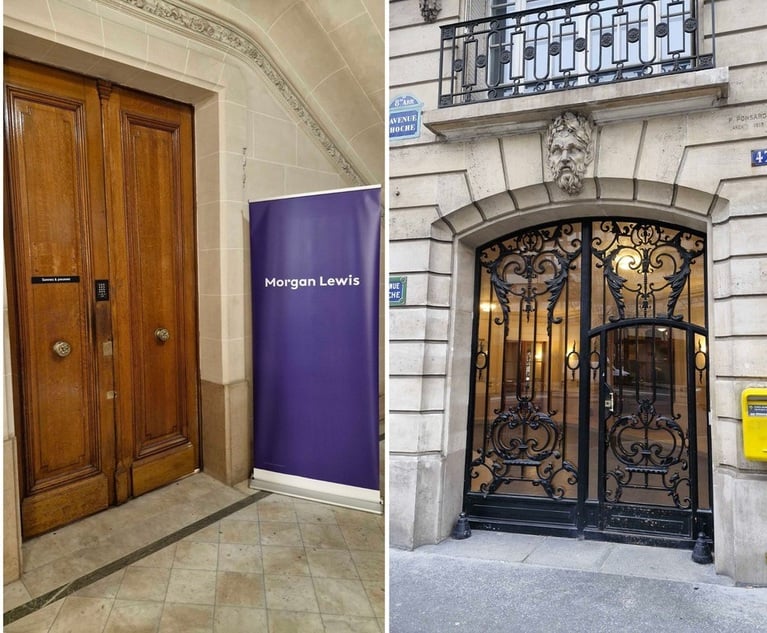Magic circle trio among 12 firms backing 'app store' for legal tech products
Top UK trio and elite US firms throw support behind collaborative legal tech venture
October 05, 2018 at 12:10 AM
8 minute read
The original version of this story was published on The American Lawyer

Twelve of the world's top law firms, including Clifford Chance (CC), Linklaters and Freshfields Bruckhaus Deringer, have joined a consortium to support a legal tech startup that has created a platform to allow firms to more quickly deploy legal tech tools such as contract analysis, discovery and practice management.
The new venture, called Reynen Court, is akin to creating an app store that will allow law firms to quickly and more securely fire up third-party software.
The consortium of law firms is co-chaired by Latham & Watkins and CC and vice-chaired by Paul Weiss Rifkind Wharton & Garrison. It also includes Covington & Burling, Cravath Swaine & Moore, Freshfields, Gibson Dunn & Crutcher, Linklaters, Orrick Herrington & Sutcliffe, Ropes & Gray, Skadden Arps Slate Meagher & Flom and White & Case.
The 12-firm group is asking tech companies to deploy 'containerised' apps into firms' private cloud environments or their own data centres. Applied to the legal world, the benefits of this new technology infrastructure pioneered by companies like Amazon, Google and Microsoft could include safer, less expensive storage of client data. But it could also supercharge the impact of disparate legal tech solutions by allowing them to work together.
➤➤ Effective legal collaboration strategies and innovative partnerships will be explored on day one of LegalWeek CONNECT, taking place on 28-29 November at County Hall, London SE1. Click here for more information
If legal tech vendors adopt Reynen Court's platform, products that, for instance, analyse contracts, conduct decision-tree reasoning and draft documents, could interact with each other.
"If you could join those things together you could conceive of a much more automated production line: find the right clauses, figure out the logic to apply and write the new legal document," said CC chief information office Paul Greenwood. "That is where, ultimately, we'd like to get to. And the idea of the consortium is to say to the legal startup industry and the legal tech industry: we see great value in your solutions; you have great ability to really transform the way we work, but having standards is really important to us."
For legal tech vendors, working with Reynen Court's platform would give them access to a broader swathe of law firms without having the expense of configuring their products to individual firms' on premise tech infrastructure.
Reynen Court, which the firms are working with to develop a strategy as to what products should first be brought onto the platform, is run by Andrew Klein, a serial entrepreneur who before embarking on a series of business endeavours began his career as an associate at Cravath.
If Klein's past success in launching new businesses – he is a co-founder of the hedge fund SkyBridge Capital – is any indication, Reynen Court could be a first mover in an area that is set to grow.
Klein left Cravath in 1993 with the financial backing of 13 of the firm's partners to start a craft beer company, Spring Street Brewing, which he eventually brought into the public markets via one of the first internet-enabled initial public offerings. He then launched an internet-based investment bank, Wit Capital, which Goldman Sachs bought a 25% stake in before that company also went public. Wit had $400m in revenue by 2001.
After being early to the craft beer and internet-based investment worlds, in 2006 Klein founded a digital marketing company, Spotzer Media Group, where he served as CEO until last year.
"When you start a company, you are looking for big waves in technology, and you gather up smart people and you try to make something happen," Klein said. "That pattern, in the beginning was accidental. And it became a way of thinking about how you start companies."
Klein brought that process to bear as he began thinking about his next project about 18 months ago. He had become interested in the prospect of artificial intelligence and found himself thinking of ways it could be applied to the legal world. Klein also thought of his experience in the digital marketing world and how his platform had proliferated with the help of a service automation platform, which is what Reynen Court is.
"I could see the logic of all these new [artificial intelligence] applications beginning to make sense, and I also saw this explosion of vendors making applications targeted at the legal sector were focused on narrow, edge applications that do one thing very well that is very specific," Klein said.
The problem for law firms, as Klein sees it, is that the various software providers keep their information in the cloud. Law firms, for security reasons, have long required that their software providers integrate with their on-site servers.
"We have a real challenge because everything is going on the cloud," said Latham deputy CIO Rene Mendoza. "Many applications are not allowing you to be on premise anymore, and if they do, it's very expensive."
The cloud, Klein said, presents a huge challenge for law firms.
"[They] want to use these new offerings, because that requires them to take content and trust it up into a black box under the control of a vendor," he said. "So we could build a common platform and basically orchestrate bringing each application down into the chosen computing environment of a given law firm and give them complete control over the data."
That last process is the so-called 'containerisation' of those software-as-a-service offerings. It is a process that allows the logic or code of the product to be hosted on the secure networks or private cloud environment of law firms.
CC's Greenwood said the containerisation of software could be similar to the revolution brought about by shipping containers. Whereas shipping used to be an intricate and expensive dance that required fitting different-sized items onto ships or trains, the container universalised the size of things that could be shipped and also, thanks to hooks being placed in standard spots, how things were moved.
"That's the idea behind this: to not have everything different shapes and sizes, but to have everything have the same size and hooks so we can all move together," Greenwood said.
One early believer and financial supporter of the project is Tom Glocer, a former Davis Polk & Wardwell associate and ex-CEO of Thomson Reuters Corp. who met Klein while he was at Cravath. Glocer has invested in a number of Klein's ventures, including Spotzer.
"The trends he has identified in computing are essentially the story of 'how do you go to the cloud without sacrificing privacy and security?'" Glocer said. "And that has broad applicability beyond legal. But the legal world cares about it almost more than any other industry. So I said: 'Sure I'll invest my own money and I'm happy to sign on as an adviser and share whatever I've got.'"
Kenneth Heaps, the CIO at Latham, said the group is realistic that the transition to a containerised legal tech world will likely take years. But he said there is an incentive for current leading tech companies to engage with Reynen Court, which has offices in Amsterdam and near San Francisco in Piedmont, California.
"Because as competing offerings start to enter the marketplace, those that come into a Reynen Court environment may be more attractive for a law firm," Heaps said.
Klein, who named Reynen after the street he grew up on in Ridgewood, New Jersey, said the timing issue will be one of the trickier aspects of the company's rollout. But he is still convinced that artificial intelligence will have a significant impact on the legal market.
"It's a little bit distant. It's not tomorrow," Klein said. "But if we're half right about the significance these technologies will have in the practice of law, then a platform like we're trying to build will be an essential piece of plumbing to help firms accelerate the use and adoption of those technologies. We might be a little bit early, but I think this is going to come in a pretty significant wave."
This content has been archived. It is available through our partners, LexisNexis® and Bloomberg Law.
To view this content, please continue to their sites.
Not a Lexis Subscriber?
Subscribe Now
Not a Bloomberg Law Subscriber?
Subscribe Now
NOT FOR REPRINT
© 2025 ALM Global, LLC, All Rights Reserved. Request academic re-use from www.copyright.com. All other uses, submit a request to [email protected]. For more information visit Asset & Logo Licensing.
You Might Like
View All
Deadline Extended for The European Legal Innovation & Technology Awards
1 minute read
Morgan Lewis Says Global Clients Are Noticing ‘Expanded Capacity’ in Paris After Kramer Merger
5 minute read
Debevoise, Norton Rose & Boies Schiller Lead Surge in Mining Disputes With African Governments
5 minute read
Linklaters Continues Renewable Energy Hot Streak With Latest Offshore Wind Farm Project
2 minute readTrending Stories
Who Got The Work
J. Brugh Lower of Gibbons has entered an appearance for industrial equipment supplier Devco Corporation in a pending trademark infringement lawsuit. The suit, accusing the defendant of selling knock-off Graco products, was filed Dec. 18 in New Jersey District Court by Rivkin Radler on behalf of Graco Inc. and Graco Minnesota. The case, assigned to U.S. District Judge Zahid N. Quraishi, is 3:24-cv-11294, Graco Inc. et al v. Devco Corporation.
Who Got The Work
Rebecca Maller-Stein and Kent A. Yalowitz of Arnold & Porter Kaye Scholer have entered their appearances for Hanaco Venture Capital and its executives, Lior Prosor and David Frankel, in a pending securities lawsuit. The action, filed on Dec. 24 in New York Southern District Court by Zell, Aron & Co. on behalf of Goldeneye Advisors, accuses the defendants of negligently and fraudulently managing the plaintiff's $1 million investment. The case, assigned to U.S. District Judge Vernon S. Broderick, is 1:24-cv-09918, Goldeneye Advisors, LLC v. Hanaco Venture Capital, Ltd. et al.
Who Got The Work
Attorneys from A&O Shearman has stepped in as defense counsel for Toronto-Dominion Bank and other defendants in a pending securities class action. The suit, filed Dec. 11 in New York Southern District Court by Bleichmar Fonti & Auld, accuses the defendants of concealing the bank's 'pervasive' deficiencies in regards to its compliance with the Bank Secrecy Act and the quality of its anti-money laundering controls. The case, assigned to U.S. District Judge Arun Subramanian, is 1:24-cv-09445, Gonzalez v. The Toronto-Dominion Bank et al.
Who Got The Work
Crown Castle International, a Pennsylvania company providing shared communications infrastructure, has turned to Luke D. Wolf of Gordon Rees Scully Mansukhani to fend off a pending breach-of-contract lawsuit. The court action, filed Nov. 25 in Michigan Eastern District Court by Hooper Hathaway PC on behalf of The Town Residences LLC, accuses Crown Castle of failing to transfer approximately $30,000 in utility payments from T-Mobile in breach of a roof-top lease and assignment agreement. The case, assigned to U.S. District Judge Susan K. Declercq, is 2:24-cv-13131, The Town Residences LLC v. T-Mobile US, Inc. et al.
Who Got The Work
Wilfred P. Coronato and Daniel M. Schwartz of McCarter & English have stepped in as defense counsel to Electrolux Home Products Inc. in a pending product liability lawsuit. The court action, filed Nov. 26 in New York Eastern District Court by Poulos Lopiccolo PC and Nagel Rice LLP on behalf of David Stern, alleges that the defendant's refrigerators’ drawers and shelving repeatedly break and fall apart within months after purchase. The case, assigned to U.S. District Judge Joan M. Azrack, is 2:24-cv-08204, Stern v. Electrolux Home Products, Inc.
Featured Firms
Law Offices of Gary Martin Hays & Associates, P.C.
(470) 294-1674
Law Offices of Mark E. Salomone
(857) 444-6468
Smith & Hassler
(713) 739-1250








